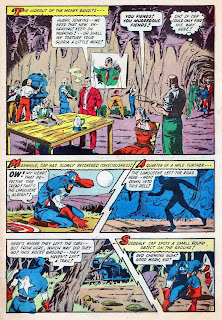in Os filhos do medo. Porto Alegre, Editora Globo, 1950 (Coleção Autores
Brasileiros, 34), p.33-35.
Um homem não
sabia a quem convidar para compadre de tantos filhos que já tinha.Quando nasceu
o caçula, falou à mulher que convidaria até o diabo para padrinho do menino.
Saiu e encontrou um homem muito bem apessoado. Convidou-o para compadre e ele
aceitou.
Depois do batizado, o padrinho
carregou o afilhado. Ficou com ele sete anos. O pai ficou meio assustado,
porque o padrinho nunca mais aparecia com o garoto e então veio a madrinha, que
era Nossa Senhora, e se ofereceu para procurá-lo.
Foi. O menino estava no inferno e o
padrinho tinha lhe mostrado todos os quartos. Em cada quarto estava uma cama cheia
de fogo. A cama onde havia mais labaredas estava separada das outras. O diabo
falou: "Esta cama é para o maior ladrão do mundo. O ladrão Gaião".
Nossa Senhora apareceu e levou o
menino para a casa dos pais. Ele contou então que o padrinho era o diabo e
contou tudo o que tinha visto no inferno.
O ladrão Gaião soube e veio
conversar com ele. "Menino, é verdade que você viu no inferno a cama cheia
de labaredas que era para mim?" "Vi, sim. Meu padrinho é o diabo e me
mostrou." Então o ladrão tornou a perguntar: "Você tem coragem?"
"Tenho, sim." "Tem coragem de me cortar em pedacinhos?"
"Tenho."
Foram os dois para o meio do mato. O
ladrão Gaião puxou uma faca e disse: "Vá me cortando em pedaços. Cada
gemido ou cada grito que eu der, diga: 'Seja tudo pelo amor de Deus'."
O garoto assim fez.Cortou o ladrão
em pedacinhos. Quando ele gemia, o menino falava: "Seja tudo pelo amor de
Deus!" Em vista do seu arrependimento e do seu martírio, Deus o perdoou e
o grande ladrão foi para o céu.
Acontece que no alto de um morro
deserto morava um monge que fazia penitência. A vida que levava era tão
agradável a Deus, que era servido pelos anjos. Estes lhe traziam o sustento de
cada dia.
No dia da morte do ladrão, o almoço
demorou mais. "Vocês já ficaram brincando pelo caminho, outra vez?"
ralhou quando os anjos chegaram. "Não, senhor. Hoje nos demoramos porque
houve festa no céu. O senhor não soube da morte do ladrão Gaião? Pois ele se
arrependeu do que fez e foi perdoado." O monge então falou:"Se o
ladrão entrou no céu, quanto mais eu, que já em vida sou servido pelos
anjos!"
Só por isso, o monge se perdeu e a
cama cheia de labaredas do inferno ficou para ele.
(Colhida no vale
do Paraíba em 1940)
* * *
O ladrão Gaião era o maior ladrão do
mundo. E era atrevido, arrogante e perverso.
Pois esse mau tinha um irmão que era
um santo. Tão santo, que, em vida, já comia pela mão dos anjos. Todos os dias,
nem bem dava meio-dia, vinham os anjos trazer-lhe maná do céu, para o seu
sustento.
Foi um dia, morreu uma criança sem
batizar. Bateu no céu mas foi-lhe negada entrada. Mas tanto chorou, tanto
pediu, que Deus ficou com muita pena e disse: "Tome este copo e volte à
terra. Quando você o tiver enchido de água limpa, bem limpa, pode voltar que eu
abro a porta".
O menino saiu chorando e, em todas
as fontes enchia o copo. Olhava-o contra o sol — a água estava suja. Então
começou a clamar:
Hoje mesmo nasci
Hoje mesmo me
criei
Hoje mesmo morri
Hoje mesmo me
perdi
O ladrão Gaião
que estava sentado em cima de uma pedra escutou aquilo e pensou: "Se
aquele que hoje mesmo nasceu e morreu, assim mesmo se perdeu, o que será de mim
que sou tão pecador?"
Começou a pensar nos seus crimes e
teve um arrependimento tão profundo que chorou. O menino passou por ele e viu
as lágrimas. Aparou-as com o copo. Quando o colocou diante da luz, estavam tão
limpas que cintilavam. Louco de alegria, correu ao céu e pôde entrar.
Nesse mesmo dia o ladrão morreu e
também foi para o céu. E, com tudo isso, os anjos atrasaram o almoço do santo.
Bateu meio-dia e nada de almoço. Bateu uma hora e nada. Lá pelas três horas
vieram os anjos. O santo pergunto: "O que foi que vocês andaram fazendo no
caminho, que só agora é que estão chegando?"
Então os anjos contaram: "O
senhor não sabe. Hoje houve festa no céu". "Por que?"
"Porque o ladrão Gaião se arrependeu e salvou-se. Foi para o céu e nós
fizemos uma festa." O santo teve um pequenino pensamento vaidoso. Um só e
foi o bastante. Pensou: "Se o ladrão Gaião, que era tão pecador, se
salvou, e eu então que já como pela mão dos anjos..."
No outro dia, o santo esperou, e no
outro, e, depois, no outro. Os anjos nunca mais lhe apareceram para trazer
comida.
(Contada pela mãe da autora)












